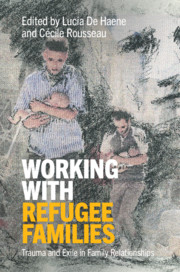Book contents
- Working with Refugee Families
- Working with Refugee Families
- Copyright page
- Dedication
- Contents
- Contributors
- Foreword
- Acknowledgments
- Introduction
- Part I Refugee Family Relationships
- Chapter 1 The Role of Family Functioning in Refugee Child and Adult Mental Health
- Chapter 2 Transgenerational Trauma Transmission in Refugee Families
- Chapter 3 Pre- and Post-migration Trauma and Adversity
- Chapter 4 Cultural Belonging and Political Mobilization in Refugee Families
- Chapter 5 Forced Separation, Ruptured Kinship and Transnational Family
- Chapter 6 Family Relationships and Intra-family Expectations in Unaccompanied Young Refugees
- Part II Trauma Care for Refugee Families
- Part III Intersectoral Psychosocial Interventions in Working with Refugee Families
- Conclusion
- Index
- References
Chapter 6 - Family Relationships and Intra-family Expectations in Unaccompanied Young Refugees
from Part I - Refugee Family Relationships
Published online by Cambridge University Press: 21 August 2020
- Working with Refugee Families
- Working with Refugee Families
- Copyright page
- Dedication
- Contents
- Contributors
- Foreword
- Acknowledgments
- Introduction
- Part I Refugee Family Relationships
- Chapter 1 The Role of Family Functioning in Refugee Child and Adult Mental Health
- Chapter 2 Transgenerational Trauma Transmission in Refugee Families
- Chapter 3 Pre- and Post-migration Trauma and Adversity
- Chapter 4 Cultural Belonging and Political Mobilization in Refugee Families
- Chapter 5 Forced Separation, Ruptured Kinship and Transnational Family
- Chapter 6 Family Relationships and Intra-family Expectations in Unaccompanied Young Refugees
- Part II Trauma Care for Refugee Families
- Part III Intersectoral Psychosocial Interventions in Working with Refugee Families
- Conclusion
- Index
- References
Summary
Unaccompanied young refugees form a particular group amongst refugee children and adolescents. Although they are often identified as a homogenous group, they largely differ, such as in their educational backgrounds, migration motives and expectations, mental health status and wellbeing, and familial contexts. The process of familial separation throughout the migration trajectory and settlement process leads to complex and dynamic processes of searching for renewed equilibriums between new social networks in the host country, maintaining relationships with and receiving support from family members in the home country and meeting (supposed) expectations from and continuous caring for family members back home. Given the important of social support and family loyalties to the wellbeing of these young refugees, both practitioners and policy-makers need to take hold of these complex aspects in their daily care practices and policy-making.
Keywords
- Type
- Chapter
- Information
- Working with Refugee FamiliesTrauma and Exile in Family Relationships, pp. 103 - 116Publisher: Cambridge University PressPrint publication year: 2020
References
- 5
- Cited by

